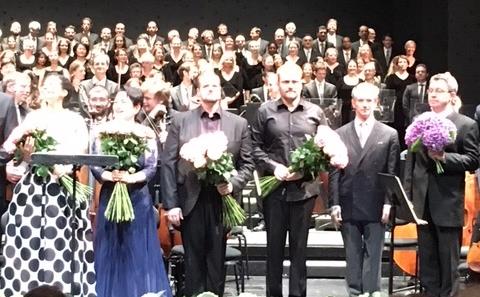 Switzerland Mendelssohn, Elijah: Soloists, Chorus and part-time choruses of the Zurich Opera (chorus-master, Janko Kastelic), Philharmonia Zurich / Fabio Luisi (conductor), Zurich Opera, Zurich 15.7.2018. (JR)
Switzerland Mendelssohn, Elijah: Soloists, Chorus and part-time choruses of the Zurich Opera (chorus-master, Janko Kastelic), Philharmonia Zurich / Fabio Luisi (conductor), Zurich Opera, Zurich 15.7.2018. (JR)

and Janko Kastelic (c) John Rhodes
Soloists:
Christof Fischesser – Elijah
Golda Schultz – The Widow, Angel
Benjamin Bruns –Obadjah/Ahab
Mihoko Fujimura – The Queen
Soyoung Lee, Natalia Tanasii – sopranos
Gemma Ní Bhriain, Karina Demurova – mezzo-sopranos
Thobela Ntshanyana, Omer Kobiljak – tenors
Alexander Kiechle, Donald Thomson – basses
This was the final concert of the season in the Philharmonic Concert series at Zurich Opera and part of the city’s festival commemorating 500 years after the Reformation.
How heart-warming it was to see an opera house filled to the rafters to hear an oratorio, when many amateur and even semi-professional choirs in Zurich (and I suspect elsewhere) are struggling to find audiences and even survive financially. A top conductor with a penchant for Mendelssohn with four internationally renowned soloists and a well-known choral work all conspired to bring many music-lovers out on a hot Sunday morning; it helped that there was no time clash with either the Mens’ Final at Wimbledon or the World Cup Final, though no Swiss player or team had made it to either.
Fabio Luisi, in an interview published in the programme, took the view that Elijah (or Elias as it is known here) was not only one of Mendelssohn’s masterpieces but perhaps even the greatest of all oratorios, as exciting as an opera. The oratorio focuses on the prophet Elijah and his attempts to persuade the Hebrew people to discard their pagan Gods such as Baal and honour only one God. Luisi describes the work as a Jewish oratorio: Mendelssohn came from a traditional Jewish family in Leipzig, the grandson of a famous Jewish philosopher, Moses Mendelssohn. The family tried to assimilate and integrate into ordinary German society by having their children baptized; this left them rather confused about what they really believed (which is the stuff of the oratorio) and Mendelssohn clung on to his Jewish roots.
We were warned that Christof Fischesser was suffering from a throat infection and on antibiotics, but other than the odd croak at the end of one or two of his longer arias, you would not have guessed it. I would still rather have Fischesser with a throat infection than many another bass in perfect vocal health. He was magnificent though he looked rather strained and miserable.
Almost stealing his vocal show was Golda Schultz, from South Africa, a young soprano whose voice glistened as the widow and the angel. With her beautifully rolled ‘r’s, her diction was a delight. She has sung Sophie in the Rosenkavalier to great acclaim in Munich a few years ago and repeated the role at the Salzburg Festival a year later. Last year saw her Met debut, and she has also graced the stages of Milan, Vienna and Glyndebourne. Her opening of Part II ‘Höre Israel’ was stunning; she always seemed engaged with the meaning of the words, something which did not apply to Japanese mezzo Mihoko Fujimura who looked disinterested throughout, her diction rather unclear, though the voice was impressive enough.
Benjamin Bruns was an imposing and sound tenor, completing the quartet. When the four sang together, they blended perfectly.
Minor roles were ably taken by no fewer than eight members of the International Opera Studio, based at Zurich Opera. Soyoung Lee and Gemma Ní Bhriain stood out with their short solo contributions.
The 106-strong chorus was made up of roughly half regular Opera House chorus members, whereas the other half were part-time chorus and extra singers brought in for this monumental work. They sang very well, although a few too many heads were buried in their scores; this is not their usual repertoire and amateur choruses would have had many more months of rehearsal. The main problem was that of balance and projection. Most opera house stages are not designed for works of this type. The orchestra had been lifted out of the pit onto a platform covering the pit, meaning the soloists towered over the front row of the Stalls and stared us all in the eyes; they were visible and audible. The orchestra took up the front part of the stage so the chorus seemed (and sounded, and looked) a long way back. Their sound was often constricted, squeezed into too narrow a space, and consequently they lacked both presence and immediacy. Sometimes too they were overpowered by the orchestra. Choirs need to be further forward for greatest effect, for best eye contact with the conductor and for ensemble with the orchestra: it works in surprisingly few halls.
The Philharmonia were in fine form, led by the energetic Hanna Weinmeister.
Luisi was at the top of his game, clearly an ardent admirer of Mendelssohn. Hopefully he and the powers that be in the opera house, buoyed on the success of this performance, will schedule another oratorio in two seasons’ time (next season has no such work) – perhaps Paulus?
John Rhodes